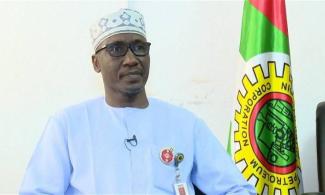
Mele Kyari claimed that there are numerous causes of petrol scarcity that are beyond the national oil company's control.
Mele Kyari, group chief executive officer (GCEO), Nigerian National Petroleum Company (NNPC) Limited, has said distribution problems, and greedy people at petrol depots and filling stations were the cause of petroleum scarcity in Nigeria.
The NNPC Director stated this while appearing on NTA’s ‘Good Morning Nigeria‘ programme.
SaharaReporters earlier reported that the price of premium motor spirit (PMS), otherwise called petrol, had gone up, with some fuel stations selling for as high as N400 per litre.
The official cost of the product used to be N165 per litre before recent reports accused the government of quietly increasing it to N185 per litre. But due to the scarcity of the product and the rising demand, many fuel stations have been selling for between N340 and N400 per litre.
The scarcity of the product is currently causing untold hardship for Nigerians.
Commenting on this, Mele Kyari claimed that there are numerous causes of petrol scarcity that are beyond the national oil company's control.
He said, “It is a chain of relationships. It is a chain of engagement and we take responsibility. We are the single point of communication for this. We understand this very perfectly but the reality today is that there are a number of things happening.
“There is greed. Greed is not in the NNPC. Greed is across the value chain; it is all the way from the depots to the fuel stations to the trucks to those you meet on the road.”
According to Kyari, as oil marketers move products from location to location, a variety of fees (at the local and state government levels) are paid and various collections are made, adding to the logistical challenge.
“And ultimately, our most recent engagements have addressed this so that those complications that are outside the control of the NNPC are now addressed. Because of the engagement we had with our trade partners, the government security agencies, and regulatory agencies, we are very optimistic that it is a very good transition,” the GCEO said.
Speaking about the recent protest in Edo State over petrol scarcity, he said truck owners were hesitant to transport petroleum products to the state after learning about the uprising in Benin.
“That is why in Benin, once there is a threat to security and safety of their vehicles, truck owners will not allow their trucks to go to such locations. Some of these threats predate the actual event because this is a world of social media.”
He continued: “People are aware that people are generating protest and once they are aware of this, people will ask their drivers not to go to this location, and you will definitely not have products because no one will take their trucks to locations where they can risk those trucks.
“I have engaged with the governor where those protests emanated — those state components — and I am very grateful to him. I told him that we must do something so that we can contain this uprising.
“Otherwise, nobody will bring his trucks to the state and he assured me that for the safety of the trucks, vigilantes will be deployed, government security agencies will come, so that ultimately, this product will get to Benin depot, so that they could ultimately end up in the fuel station.
“People are aware that people are generating protest and once they are aware of this, people will ask their drivers not to go to this location, and you will definitely not have products because no one will take their trucks to locations where they can risk those trucks.
He noted that once prices were crashed at the depot, the prices at filling stations would also decrease and “that arbitrage will disappear”.